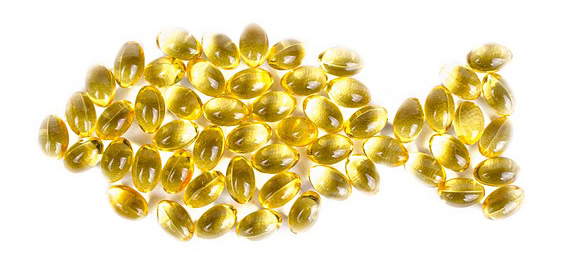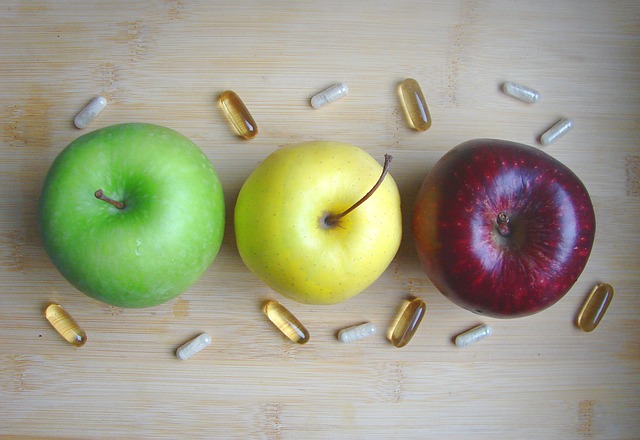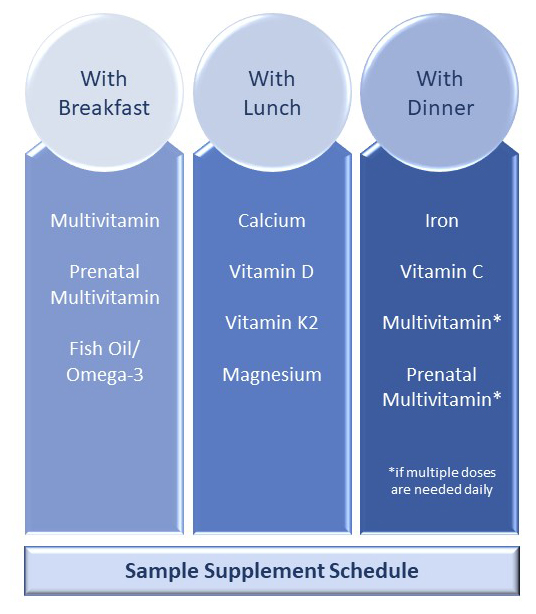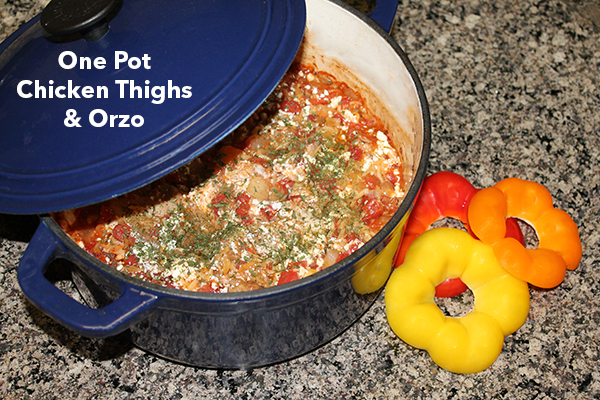With or without food? Morning, midday or evening? How should I take my supplements?
How and when you take supplements is just as important as which supplements you take. The timing and quality of supplements determine how many nutrients your body is actually able to absorb and use.
Ideally, everyone would get all the nutrients their body needs from food. However, with our changing and heavily processed food supply, that is getting harder and harder to achieve. Multivitamins, vitamins and minerals are necessary in certain situations, but everyone doesn’t need them. Should you be taking a multivitamin? Find out.
Supplements should be considered (as the name suggests) an adjunct to wholesome, nutritious foods taken to boost nutrients that are deficient or that your body needs a higher amount of. Always think food first! But consider adding a high-quality supplement when needed.
With or without food? Morning, midday or evening? How and when you take #supplements is just as important as which ones you take. Use these tips to get the most out of your supplements. #saslife Click To TweetWhen to Take Supplements
Most supplements should be taken with food to reduce GI upset and improve absorption by slowing down the transit time through the GI tract. However, there are a few that can be taken any time of day irrespective of food. So how do you keep it all straight?
Here are some strategies for key vitamins and minerals that often need supplementation in the general population. The list below is not exhaustive, and you may need some, all or none of the supplements. If you have more complex health needs or supplement questions, please contact your healthcare provider or a registered dietitian/nutritionist.
 Best with Food
Best with Food
- Multivitamin*
- Prenatal Multivitamin*
- Magnesium
- Vitamin C
- Fish Oil/Omega-3*
- Fat-Soluble Vitamins A, D, E and K*
- CoQ10*
* Consume with a meal that contains at least 1 teaspoon, or about 5 grams, of fat to maximize absorption. Sorry, cereal and skim milk won’t cut it!
Okay without Food
- Chelated Mineral Supplements (i.e. calcium citrate and magnesium glycinate)
- Chelated minerals do not need stomach acid to break them down and can, therefore, be taken on an empty stomach.
- Iron
- Iron is best absorbed on an empty stomach. However, for many individuals, taking iron without food causes GI upset.
- If you do not tolerate iron well, take it with a meal to reduce GI upset.
Better Together
Some nutrients enhance the absorption of other nutrients. Take these supplements at the same time or pair them with food sources of the other nutrient to boost absorption. For example, take iron supplements with an orange or Vitamin D with a bowl of plain, grass-fed Greek yogurt.
- Vitamin D, Calcium, Vitamin K2 and Magnesium
- Vitamin C and Iron
Better Apart
Certain nutrients interfere and compete with one another, so it’s best to take them at different times to ensure optimal absorption.
- Calcium
- When taking a separate calcium supplement >200mg per dose, take it 1-2 hours apart from multivitamins or supplements containing iron, zinc, magnesium, folate or fiber.
- Most multivitamins contain little to no calcium. However, if your multivitamin contains calcium, as long as it is <200mg per dose, it should not interfere with the absorption of other nutrients.
- Magnesium
- When taking a separate magnesium supplement >250mg per dose, take it 1-2 hours apart from multivitamins or supplements containing iron, zinc, calcium, folate or fiber.
- Zinc
- It is not advised to take high doses of zinc long-term (50mg or more daily for 10 weeks or longer), because this can cause a copper deficiency. If you are advised to take zinc long-term, consider supplementing with a high dose of copper as well.
Medication/Supplement Interactions
Vitamins and minerals not only interact with one another, they can also affect the absorption and effectiveness of certain medications. Always consult your healthcare provider, pharmacist and/or registered dietitian/nutritionist before starting a new supplement to ensure it won’t interact with any medications you are taking. Here are just a few examples of potential medication/supplement interactions:
- Thyroid Medications (Synthroid, Cytomel, Armour Thyroid, Nature-Throid, etc.)
- Avoid supplements containing calcium, magnesium, iron and soy (including soy protein powders) within 4 hours of taking medication.
- Take biotin at least 1 hour after thyroid medications. Biotin can also cause abnormal lab results, so it’s advised to stop taking biotin about a week prior to testing thyroid levels.
- Antacids containing aluminum hydroxide and magnesium hydroxide should be taken at least 4 hours apart from thyroid medications because they can delay or prevent absorption of the medication.
- Blood-Thinning Medications (Coumadin, Warfarin, etc.)
- Avoid taking Vitamin E with blood-thinning medication as it can increase anti-clotting activity and increase risk of bleeding.
- Consume consistent amounts of Vitamin K from food (green, leafy veggies) and supplements as it can decrease the effectiveness of the medication if consumed in large and/or varying amounts.
- Bisphosphonates
- While it is often advised to take calcium, vitamin D and bone-boosting medications all at the same time, taking calcium supplements with bisphosphonates may decrease the absorption of the medication.
- Take calcium supplements at least 2 hours apart from bisphosphonates.
- Anti-Seizure Medications
- Take calcium supplements at least 2 hours apart from these medications as they can lower calcium levels.
- PPIs and H2 Blockers (Prilosec, Nexium, Prevacid, Pepcid, Zantac, etc.)
- Avoid taking iron and magnesium supplements within 2 hours of these medications as they can decrease iron and magnesium absorption.
Remember to Take Your Supplements!
The best laid supplement schedule means nothing if you don’t remember to take them! Place supplement containers in an easily visible place that you won’t overlook- next to the coffee maker, beside your toothbrush, in your lunch bag, under your computer monitor, etc. If visual cues aren’t enough, then set reminders on your phone and/or computer.
What’s the Bottom Line?
If all these specifics are just too much to keep straight, remember these key takeaways:
- Take your multivitamin and any fat-soluble vitamins (A, D, E, K) with a meal that contains fat.
- Keep your calcium and iron supplements separate.
- Always check with your healthcare provider, pharmacist and/or registered dietitian/nutritionist before starting a new supplement to discuss any potential interactions or contraindications.
- Print this cheat sheet for easy reference.
And don’t forget to focus FIRST on food! Your body prefers to get nutrients from food so channel your energy towards planning nutritious meals full of colorful, whole foods. Then sprinkle in high-quality supplements as needed!
Resources: Washington Post, Consumer Lab
One Pot Chicken Thighs and Orzo
Recipe Adapted From: Food & Nutrition Magazine, Jan/Feb 2019
Makes 6 Servings
Ingredients
1 Tbsp extra-virgin olive oil
1½ pounds boneless skinless chicken thighs
1 cup diced yellow onion
1 cup diced bell pepper
2 Tbsp minced garlic
2 tsp dried oregano
½ tsp ground cinnamon (or 1 cinnamon stick)
¾ tsp salt
¼ tsp black pepper
1 tsp cumin
1 cup whole wheat orzo
28 oz canned no-salt added diced tomatoes
1 cup chicken stock + ¼ cup for deglazing
¼-½ cup crumbled feta cheese, optional
¼ cup chopped parsley, optional
Directions
- Pre-heat oven to 350ºF.
- Heat a Dutch oven or heavy oven-safe pot on the stove over medium-high heat.
- Add olive oil and heat about 30 seconds.
- Add chicken and brown for 2-3 minutes, turn chicken over and brown for another 2-3 minutes.
- Remove chicken from pot and set aside.
- Saute onion and pepper in chicken drippings/ leftover oil (add additional olive oil, if necessary) for about 5 minutes.
- Add garlic and sauté for 1 minute.
- Add oregano, cinnamon, salt, pepper, cumin and orzo and sauté for 1 minute, stirring continuously.
- Add ¼ cup chicken stock and deglaze pot by stirring continuously and scraping up any brown bits from the bottom.
- Add tomatoes and remaining 1 cup of chicken stock and stir well.
- Return chicken to pot and stir.
- Place pot in oven (uncovered) and bake 30 minutes, stirring once halfway through.
- Top with feta cheese and parsley, if desired.
- Serve with a side salad or other non-starchy vegetable of choice.





8 Comments
Any advice on turmeric?
Take turmeric with food and if the supplement does not contain black pepper extract or piperine then be sure to have black pepper with the meal to maximize absorption.
I'm confused a bit.
Your suggested supplement timetable chart lists taking calcium, K, D and magnesium at lunch. Yet, in other paragraphs it states that magnesium and calcium shouldn't be taken together.
Can you clarify please? Also, I keep reading conflicting references to taking K2 and D. Yes, both are necessary, but some advise taking them at the same time while others state that fat soluble vitamins (with the exception of vitamin A), compete for absorption sites and are better utilized when taken at separate meals.
Thanks for more information!
It can be confusing for sure. For calcium and magnesium, the concern is when they are being taken in larger amounts. If the separate calcium supplement is >200mg per dose then you would not want to take it with magnesium (or the other nutrients mentioned). The same is true for magnesium, but in doses >250mg. If doses are under those amounts, it's fine to take together.
While there may be some competition among fat soluble vitamins, at this time I don't think it's clinically significant enough to recommend separating them. There are lots of documented benefits to the synergistic nature of vitamins D and K2. However, if you are concerned and wish to take them separately, then go for it. Just be sure to take both with some healthy fat to boost absorption.
Can you take k-7, A, E, D, and eye supplement together?
Yes, you can take those together. Due to the fat-soluble vitamins (A, D, E, K), be sure to take it with a meal that contains fat.
What about probiotics? When would you add those in and are they alright to take with multivitamins and supplements?
The timing of probiotics will vary based on the product. Some are best with food and others without, so follow the instructions on the packaging. Probiotics can be taken with other multivitamins and supplements as they should not impact absorption of other vitamins and minerals.